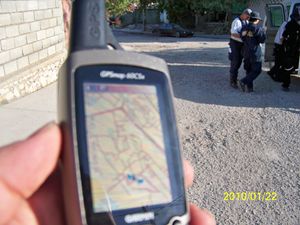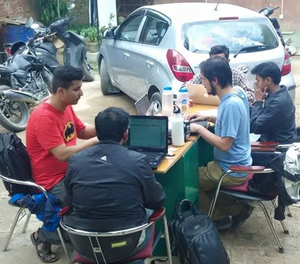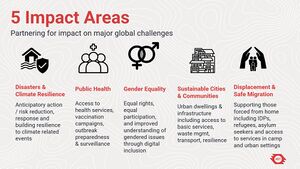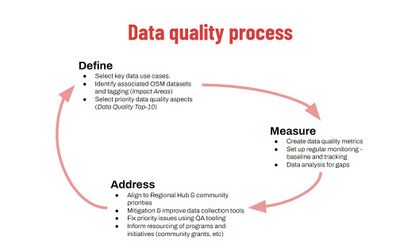Humanitarian OSM Team
 While you participate, we ask that you do your best to uphold the code of conduct of our community. See our HOT Community Code of Conduct.  The community responded rapidly, creating the best map resources available. Our maps continue to be used for development planning, and HOT people are currently on the ground in Haiti giving training in use and improvement of the map data   |
Latest Updates
What's hot?
HOT Mission and Objectives
Mission Statement
- The Humanitarian OpenStreetMap Team (HOT) applies the principles of open source and open data sharing to humanitarian response and economic development.
Core Objectives
- To mobilise or support one million contributors to map an area home to one billion people by 2026 (see here for priority countries)
- To be the connecting point between humanitarian actors and open mapping communities
- To provide remote data creation during crises
- To collect and organize existing data sources
- To support deployments to the field
- To be a distribution point for free data
- To develop open knowledge and tools
Advocacy, Training and Outreach
- mapping parties
- Communicating and meeting with humanitarian actors and United Nations technical communities
- http://learnosm.org
- http://summit.hotosm.org/
- HOT Toolbox
Thinking and Design
- To promote crowd-sourcing and simple web standards for data sharing
- To develop technical improvements to OSM and OSGeo in response to field requirements (off-line support, verification, format adaptors, multimaster sync..)
How to Get Involved
Getting Started
Most of our volunteer needs are for remote mapping and project work. To find out more about what HOT does and how to get involved see the HOT Guide
Learning to Map
The largest volunteer need of HOT is for OpenStreetMap contributors. To get started contributing to OpenStreetMap, the community has developed a simple-to-use beginners guide called LearnOSM (learnosm.org). A series of quick lessons will guide any new user through setting up an account and beginning to map. New material is always being developed and added.
What to Work On?
Notice: A formal definition of various HOT Programs (humanitarian projects and activations) is being developed, see HOT activation for information regarding urgent response.
Humanitarian projects can be the immediate responses to natural disasters, political crises and other destructive events or projects designed to mitigate or plan for disaster risk or economic development. They are launched where up-to-date geographic data is needed and where OSM data currently is being used or will be used by local communities and/or responders. Generally, these projects are launched by active participants in the HOT community who will coordinate the remote mapping with the needs of humanitarian actors and other first responders, and with any local OSM community as guidance. If a situation becomes complex, individual(s), humanitarian actors or local communities are encouraged to reach out to the HOT Activation Working Group. If the working group decides that HOT currently has the resource and capacity to facilitate the request, it will announce an official "activation," which indicates that this crisis is a high priority for the organization. The team also may invite other NGOs to collaborate, make requests for needed resources and will document the progress and conclusion of the activation. These decisions take into account which humanitarian mapping projects and/or activations HOT currently is supporting or monitoring, as well as the potential impact on the project beneficiaries and our current capability to provide assistance.
Organised Editing Projects
Please see our dedicated wiki page for organised editing projects led by HOT. These include both remote digitising projects and community led projects on the ground.
The Tasking Manager
The Tasking Manager is a tool that divides large mapping tasks into small sections to make them easier for volunteers to manage. The Tasking Manager also includes background information on the locale to be mapped, as well as information about what kind of data is needed (road, schools, etc., and how to recognize them). Volunteers can contribute directly to current activities through HOT's Tasking Manager.
See HOT Tasking Manager Organizations for a list of organizations which are present on HOT's Tasking Manager. If your organization is not listed there and you'd like to create projects on HOT's Tasking Manager, please complete this form to register your interest. To see more information regarding use of HOT's Tasking Manager as a community/organization visit this page.
Current Remote Mapping Actions
For current Remote Activations, visit Organised_Editing/Activities/Humanitarian_OpenStreetMap_Team
Past remote mapping actions
Jobs, Internships and Contracts
- Visit our website for current opportunities on how to get involved
- For internship program see HOT Internship Programs
- For tutorships see Tutorships SubPage
Academic Research & HOT
HOT welcomes academic and scholarly research on our activities. See Academic Partnerships for some best practices and Research Topics for some ideas from us on what to study.
Governance
Global Volunteer Community
There are many ways to contribute to the mission of HOT. See the HOT Guide for the basics. All we ask is that contributors govern themselves using our Code of Conduct, which is found on our website: HOT Code of Conduct
Voting Membership
Dedicated volunteers who have been elected and make up the voting community are listed here:
- Main article: Humanitarian OSM Team/Members
Membership Code can be found here.
Board of Directors and Officers
HOT's Board of Directors (Board) is elected from the membership. Information about the Board can be found at the Board page.
Sub-pages include current and previous Board members, as well as links to all previous Board election documentation.
Board Meeting Minutes and Board documents (such as Board Annual Reports, Board President's Reports and Board Procedures) can also be accessed from the Board page.
HOT's name, legal name and registration
The Humanitarian OpenStreetMap Team (or HOT for short) is registered in the USA as a 501(c)(3) charitable organisation under the legal name HUMANITARIAN OPENSTREETMAP TEAM UNITED STATES INC (see Legal Doctrine for documentation). The usage of the OpenStreetMap mark in HOT's name is currently being clarified between HOT's executive director and board and the OpenStreetMap Foundation board. The usage of the phrase is not meant to imply that HOT has any direct affiliation with the OpenStreetMap Foundation beyond that agreed between the two organisations.
Legal Doctrine
- Humanitarian_OSM_Team/U.S. Bylaws
- Humanitarian_OSM_Team/U.S. Articles of Incorporation
- In March 2013, HOT was officially recognized as a 501(c)(3) charitable organization.
- Many issues and plans emerged from the Haiti response, leading to a medium-term plan for HOT. Access the Humanitarian OSM Team/Haiti Strategy And Proposal for more information.
Impact Areas
Solving global challenges requires an understanding of our physical environment that is grounded in direct knowledge and observations. Open mapping helps us build that understanding together, which enables humanitarian, development, and community organizations to take more informed and locally appropriate action. Impact Areas connect open mapping with real world applications through spatial data use in the humanitarian and development sectors. Each impact area at HOT provides a framework for technical and subject matter expertise for partnerships, grantmaking, and community support.
Our humanitarian work is centered on 5 Impact Areas which are;
- Disasters & Climate Resilience
- Sustainable Cities & Communities
- Public Health
- Displacement & Safe Migration
- Gender Equality
Are you working with OSM in one of HOT’s impact areas? We’d love to hear from you on what data you are using, what analysis has worked, and other feedback at data@hotosm.org.
Data Use cases & metrics for core Impact Area Datasets
Read about the Core Impact Area Datasets, Use cases & Data Quality Metrics
Community Activities
Community Types and Roles
HOT has many diverse community roles and ways to contribute to our mission. In a Community Sprint, we designed the following types:
- Connectors/Teachers
- Training and mentorship program to cross-train new leaders with the goal to have more leaders and less burnout.This role includes storytellers and communicators.
- Outreach to share the OSM educational web site LearnOSM (www.learnosm.org) and to show the community how to get involved in HOT
- Clean up general communication on the wiki and web sites to provide a clear path for those who want to get involved
- Develop target communities for outreach
- Mappers
- Participate in, and help coordinate mapping activities.
- Reach out to friends of OSM who might help with surge support in various areas (e.g. Mozilla, hubs, etc., as well as links with connectors/teachers regarding leaders).
- Maintain a wider OSM outreach plan (coordinated with respect) to get active mappers more involved with HOT.
- Identify new communities for outreach.
- Partners/Mission Supporters
- Develop a policy and guidance on how to establish mutual communication with partners, a W3 ( who does what when), there are some items in membership code of conduct.
- This group includes researchers and liaisons.
- Techies
- Identify a process to get developers involved in the Tech Working Group (more outreach, clear tasks).
- Develop and Promote technical tools.
- Maintain and support existing tools.
- Business of Mapping
- Talking points for the membership to use with partners and potential funders.
- Expand outreach strategy to get partners and potential supporters involved with HOT.
Participate in or Lead Working Groups
Our working groups perform the "business like" work of HOT. Currently there are working groups for:
- Activation
- Communication
- Community
- Fundraising
- Governance
- Technical
- Training
- Security
See Working Groups SubPage for a list and descriptions of the working groups and their contact information.
Attend Meetings
Meetings of the HOT Board and Membership
For details about
- Board Meetings (includes previous meeting minutes), please visit Board
- Membership Meetings (includes announcements and previous meeting minutes), please visit Meetings.
Other (non-official) Meetings
- 2015 HOT Summit
- HOT SaturdOpen Mapping Hub - Asia Pacificay Sprints on Mumble
- HOT Chats
- SOTM 2011 Meetup
- February 2011 Conf Call
- SOTM 2010 Meetup
Help Plant Grass-Roots OSM Communities
HOT is involved locally, working in areas vulnerable to natural disaster, recovering after a disaster, or in economic transition. HOT tries to develop a local OSM community and to create partnerships with local governments, academics and geographers who can use and contribute to OSM. These Initiatives on the ground include:
- Malawi July 2014 - Present
- Ulaanbaatar, Mongolia October 2013 - November 2015
- Western Africa (Togo, Senegal) June - July 2013
- Haiti, Northern Haiti - March-June 2013, a USAID project titled: "Engaging Youth to Map the Northern Corridor"
- Eurosha in Central and Eastern Africa, Oct 2012 - Feb 2013
- Senegal May-June 2012
- Haiti, St. Marc Spring 2012
- Indonesia
The Missing Maps Project
The Missing Maps Project is an open collaboration founded by HOT, Medecins Sans Frontieres / Doctors Without Borders (MSF), American and British Red Cross. It aims to map the parts of the world where the most vulnerable people live. Building on the excellent work done by OpenStreetMap and others in emergency-response mapping, the Missing Maps Project aims to map in a proactive way. Instead of responding to a natural disaster, conflict or epidemic, it will identify regions vulnerable to crises will map them in anticipation of crises. This means that, when a crisis does occur, local people, NGOs and other responders can start using the maps and the data immediately, saving valuable time and, potentially, lives.
Visit the Missing Maps website for more details.
HOT Microgrants
The Humanitarian OpenStreetMap Team (HOT) Community Support Program supports local people to leverage OpenStreetMap (OSM) data, tools and community to help solve local challenges. One of the ways in which we do this is by providing OSM communities with microgrants to support local mapping activities.
Click here to find more information on ongoing, future and past HOT microgrant programmes
Other HOT Activities to Date
- MapKibera Project
- Map Kibera Import .. help bring Map Kibera into OpenStreetMap
- Humanitarian_OSM_Tags
- Routing, Import of data and GPS mapping in Haiti following Hurricane Gustav
- Coordinating travel scholarships for developing world mappers to attend State of the Map 2009 & 2011
- Technical advising in Palestinian West Bank mapping
- UN and OSM
- Advocacy and Mapping Parties in Egypt, Kenya, South Africa
- FreeMapIndia 2008 Workshop Tour
- OSM training following Cyclone Nargis
- Opening and Import of UN map data for Sudan
- Humanitarian_OSM_Team/Knight News Challenge Proposal
Open Mapping Hubs
Open Mapping Hub - Asia Pacific
Open Mapping Hub - Eastern & Southern Africa
Open Mapping Hub - West & Northern Africa
Open Mapping Hub - Latin America and The Caribbean
Data Quality
How we think about data quality at HOT
There are many organizations, communities, and individuals that contribute data to OpenStreetMap and all have a different background as to why they contribute to OpenStreetMap. Some contribute because they are doing research, academic or spatial analysis and the context of data quality is looked at differently. HOT contributes to OpenStreetMap from the perspective of humanitarian and from our side, the perspective of data quality is OSM data has to be fit for purpose; it must be able to address and inform the most critical and impactful use cases and decision-making to aid our (humanitarian) partners and communities’ use of maps and data.
It is therefore our concern to understand what fit for purpose is in terms of humanitarian response and how we maintain the quality of existing OSM data and improve the quality of new contributions. HOT’s global data Team leads on Quality Control & Assurance, pulling the Data Quality strategy with the HOT regional hubs, supporting the open mapping communities, coordinating data quality internships, conducting training and preparing training materials, and giving feedback to contributors.
Our approach to data quality - what we do to promote good data quality
Bearing in mind that it is paramount to contribute good quality data to OpenStreetMap, a number of tools, processes and workflows and resources have been developed to enable mappers to improve the OSM contribution., etc
Tools
Processes and workflows
- Validation
- Data cleaning
- Improved project creation
Data Quality Internship Program
Data Quality Internship is an annual program that was established in 2020 with the main objective of supporting and raising not only great mappers and validators, but also leaders and advocates of open data, open mapping, and OpenStreetMap. Please watch out for the 2023 Data Quality internship program and don't miss the opportunity.
Data Quality Issues
HOT has prioritized top 10 data quality aspects in line with our intended humanitarian and development uses, in which we want to minimize errors. These aspects have been categorized under 3 categories - Positional Accuracy, Semantic Accuracy, and Completeness. HOT is focusing on prioritizing these aspects and implementation on how to minimize/eliminate them through HUB-centered community engagements in form of trainings, collaborating with partners, and developing tools that can be used to improve the quality of mapping.
top 10 data quality aspects include;
- Spatial offsets.
- Temporal inconsistencies.
- Feature tracing inconsistencies.
- Road network inconsistency.
- Completeness of health facilities.
- Completeness of public service data for sustainable communities.
- Administrative boundary inconsistencies.
- Tagging.
- Logical inconsistencies of map features.
- Tasking Manager project inconsistencies.
Data Quality Process

Data Quality Updates, write-ups, and articles
- We conducted a data quality discussion during state of the Map conference in Florence. Read about the blog post - Working together for better OSM data quality - 22 September 2022.
- The data quality Internship 2022 has kicked off. Read about who is attending the internship, their profiles, and how they will use the skills to improve the quality of contributions from their countries/regions - Another year, another Data Quality Internship! - 2 Oct 2022.
- Data Quality Approach for Open Mapping Hub - Asia Pacific
- Data Quality Approach LAC
Upcoming training/webinars/discussions
Getting involved
Feedback relating to data quality
Give us feedback on the OpenStreetMap Community forum, HOT Slack channel (quality-control_wg) [ dead link ], etc
Join Quality Control & Assurance meetings
- See Quality Control and Assurance Working Group for details on the group and how to join.
Best path to correction of some Data Quality Issues
- Problem user escalation process
- Validating in Tasking Manager
- Validating using QGIS
- Mapbox: Validating OpenStreetMap
Wrong Data Quality assumptions (fallacies) (example: Deprecated tags…)
- Bringing out Tasking Manager discussion into OpenStreetMap platform, please read this for the context.
Validation Support
- Help to promote Urgent Projects via Validation Weekend campaign on Twitter.
Communication
- Official:
- To email HOT staff directly: info @ hotosm.org
- Email the Communications working group: communications @ hotosm.org
- Email the Activation working group: activation @ hotosm.org
- Visit the HOT Website, sign up for the newsletter at the bottom of the page
- HOT mailing list - Moderate traffic announcements and discussion; ~1900 subscribers as of March 2017
- HOT Updates - Details of HOT activities (RSS), feel free to contact us with a suggested text for blog posts
- OSM Tasking Manager - HOT mapping coordination tool
- Social Media:
 @hotosm
@hotosm Twitter Account
Twitter Account hotosm Facebook Page
hotosm Facebook Page- HOT Facebook Public Group
- HOT LinkedIn Page
- Live Chat:
- Slack - many topic based chat channels
- Matrix Space - many topic based chat channels (was connected to Slack, broken bridge as of 2025-05)
- IRC - live text chat for spontaneous discussion, many channels, use #hot to chat with us and intermittently scheduled HOT chats
- Mumble - live voice and text running on HOT server, used for official HOT meetings as well as general discussion
Presentations
Presentations on HOT activities. Open-licensed slides are available for use in presentations.
- June 2014, Pierre Béland, Haiyan and Ebola Activations Cases Presentation at the IEEE conference in Montreal
- Jan 2014, Pierre Béland Presentation at the Open Data for Development Challenge, Montreal.
- May 2012 Harry's 20-minute overview to a geotech audience + similar slides used at PICNIC (video)
- August 2011 Update about HOT's work in Indonesia
- OSM work in the Haiti Earthquake response at UNOSAT - World Bank and The European Union Joint Research Centre workshop on Damage Assessment (Geneva 26/27 April 2010)
- FOSSGIS 2010, lightning talk about crisis mapping in Haiti by John07 Slides (German): [1]
- https://www.slideshare.net/chippy/openstreetmap-using-tools-services-hows-its-changed-humanitarian-response
- Harry - Aid Information Challenge slides + similar slides presented in Shanghai (video]
- Haiti Mapping BarCamp Canberra 2010 (Shoaib)
- gis-news.de
- CartONG at UNGIWG to represent OSM H.O.T.
- http://thinkwhere.wordpress.com/2009/07/08/reuters-alertnet-mapping-workshop/
- http://brainoff.com/weblog/2008/11/17/1374
- http://thinkwhere.wordpress.com/2008/10/24/geong-2008-forum-unsdit-open-data/
- https://www.slideshare.net/Sev_hotosm/jrc-openstreetmap-editing-and-tasking-mechanisms-20130326
- See also, a selection of relevant HOT slide decks at: https://www.slideshare.net/wonderchook, https://www.slideshare.net/nicolas_chavent or https://www.slideshare.net/Sev_hotosm/
Graphics
Handouts
Posters
HOT in the Media
- Nepal Earthquake Response
- Mapping a Way to a Better Future - AusAID
- OSM Marks The Spot - Medium (by: Tate Watkins)
- Citizen Cartographers Fill the Gaps In Maps - New Scientist, 2013-07-03
- [3] - NPR, HOT segment begins at 5:50, 2013-11-17
- Aljazeera - Digital drive aids Philippines relief - 18th Nov
- The Guardian : Online volunteers map Philippines after typhoon Haiyan - 15th Nov
- Nature - Crowdsourcing goes mainstream in typhoon response - 20th Nov
- Typhoon Haiyan/Yolanda
- West Africa Ebola Response
- Missing Maps on BBC World Service "Click" Radio - Pete Masters and Dan Stowell talking about HOT and Missing Maps, on the BBC World Service (about 7 minutes) - Wed 12 Nov 2014.
Related Initiatives and Partnerships
- HOT Package
- Data sharing through UNSDI-t
- Ushahidi and Sahana integrate OpenStreetMap
- Map Give
- Missing Maps Project
See also
- Humanitarian OSM Team/Interested OSM Users
- HOT Tasking Manager Organizations
- Humanitarian OSM Team/Members
- "Humanitarian" map style (also available on osm.org)
- HOT Mapping Tips
External resources
- [4] Humanitarian Response Portal, Administrative Boundaries, Populated places
- [5] FAO, International and Administrative boundaries
- [6] UN Second level Administrative boundaries (1:1'000'000)
- [7] MapLibrary.org, Administrative boundaries in development countries (License?)
- [8] Administrative boundaries (Redistribution, or commercial use, is not allowed without prior permission)
- [9] NGIS Populated places Geographic name files by countries
- [10] FreeGisData List of GIS Ressources
- Oxfam recent emergencies - google map. boo!
- Wikinews.org categories: politics & conflicts disasters & accidents- open licensed news